Hardline slogan of the regime
At the ceremony celebrating the 40th anniversary of Islamic Revolution, people gathered in central Tehran to show support for the country's leaders amid growing pressure from the US. They called, "Death to the USA! Death to the USA!"
People held anti-US and anti-Trump posters. One boy said of Trump, "He is a terrorist. He is a psycho."
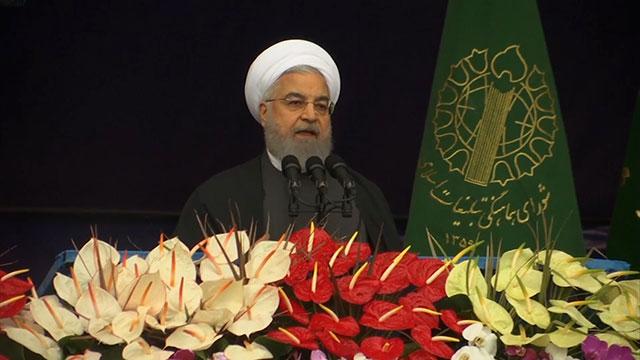
At the ceremony, President Hassan Rouhani highlighted the military's power and how it has been growing steadily over the years. "Iran has kept surprising the world with its military buildup over the past 40 years. We do not need to seek permission from other countries to go ahead with missile development programs," he said.
Rouhani said Iran and the United States have been engaging in psychological warfare, and that the Iranian people must be united to resist.
Iranian revolution
The revolution began 40 years ago with the aim of ridding the country of American influence.
Before it took place, the country was ruled by the monarchy of Mohammad Reza Shah Pahlavi. With the strong support of the US, the Shah became autocratic. Privileged classes monopolized the wealth and most of the country lived in poverty.
But in 1979, the monarchy was overthrown in the revolution and the Islamic Republic was established. The leader of the revolution, Ayatollah Khomeini, became the first Supreme Leader of the country.
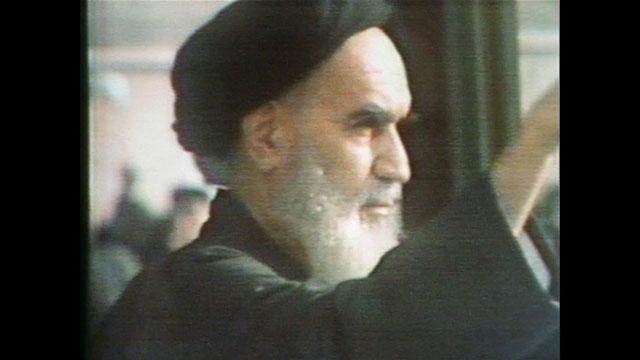
Students supporting Khomeini occupied the US embassy for more than 400 days. Washington broke off diplomatic relations with Tehran and imposed heavy economic sanctions. That was the beginning of a 4-decade stand-off.
Last year, US President Donald Trump pulled out of a 2015 international deal intended to curb Iran's nuclear ambitions. His administration also re-imposed sanctions on the country, calling it the world's largest state sponsor of terror.
Tehran today
Away from the ceremonial venue, many people were out enjoying the holiday just like a normal day off.
Now, more than two-thirds of Iran's population is made up of younger generations who did not experienced the revolution, and a growing number of young people are indifferent to the Islamic administration.
We stopped by the popular Tajrish Bazaar, which has long been supplying people in Tehran with everything from clothes and accessories to food. But there's a tension in the air these days.
People are saying prices are skyrocketing. A shop owner says, "There are fewer imported products, prices are higher, and people are buying less."
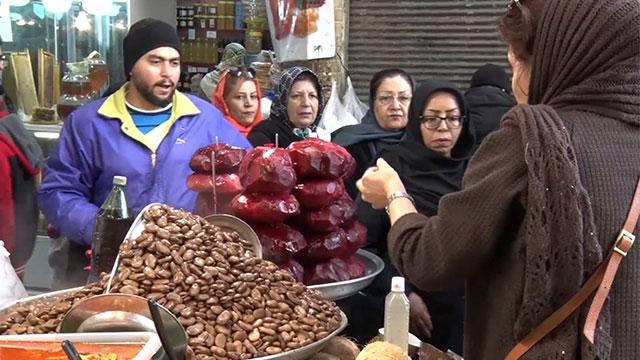
Looking back ten years
In such everyday scenes, the ongoing effect of US policy on life in Iran is apparent. Some ten years ago, we interviewed young people about their views on America.
Hadi Zeinali was 24 years old. He was a member of the Basij, a militia group that upholds the ideology of Iran's Revolution.
But his high school classmate Reza Sanei used to spend time in Internet cafes reading about the United States. He was excited about the new Obama administration and its proposal to hold dialogue with Iran.
These young men were divided in their views about America. Such contrasting opinions were typical at the time.
Sanei said, "Countries allied with the US are affluent, so why do we, Iran, need to enforce this rule against engaging in dialogue with the US?"
But Zeinali, who was against the US, said, "We’re saying no to the US’s wrongheaded policies. Wealthy countries become wealthy as a result of their own efforts."
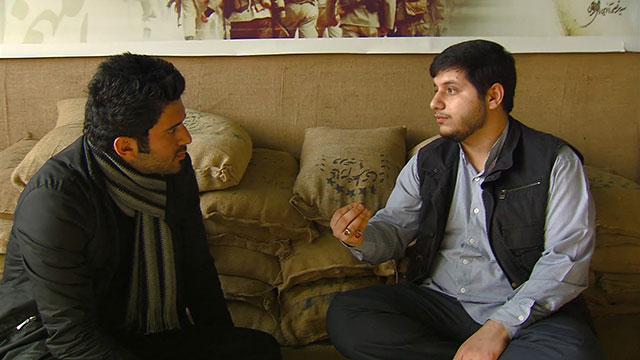
After the 2015 Iran Nuclear Deal, nuclear-related sanctions were lifted. Iran doubled its crude oil exports and foreign companies entered the market. The mood was one of optimism, until US President Donald Trump withdrew from the Iran nuclear deal.
To get an idea of how much that impacted people's views, we went back to find those two young men from 10 years ago. Hadi Zeinali is still a member of Basij. He oversees religious ceremonies at a local mosque.
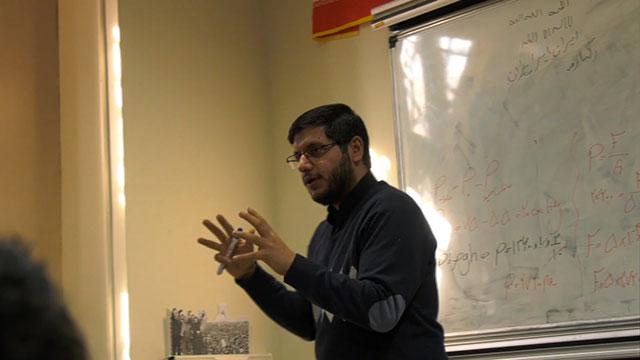
He's also a high school teacher in Tehran. He teaches his students the significance of the revolution. He tells them, "The difference between faithful students like you and ordinary students is whether your thoughts are God-centered or self-centered."
Ten years on, Zeinali 's view toward the US has become even tougher. He says, "When Obama extended his hand to negotiate, we were cautious because we knew it was a cast iron hand inside a glove. Now, Trump has shown us the true hand. It's a good lesson for Iranians that we must never trust a smiling enemy."
Worrying about the future
As for Reza Sanei, his view toward the US has changed in a negative direction. Sanei now runs a small shop selling sandwiches for about a dollar apiece.
He earned a master's degree and landed a full time job as an industrial engineer. But his salary was low. Five years ago, he quit his job and opened his shop.
He is concerned about the future prospects of his business. "The salaries of my customers have decreased due to the bad economy and inflation," he says. "People like me who thought back then that Iran-US relations might improve are disappointed. You keep trying to make it work out but eventually you just give up. And you accept the situation as it is and deal with it."
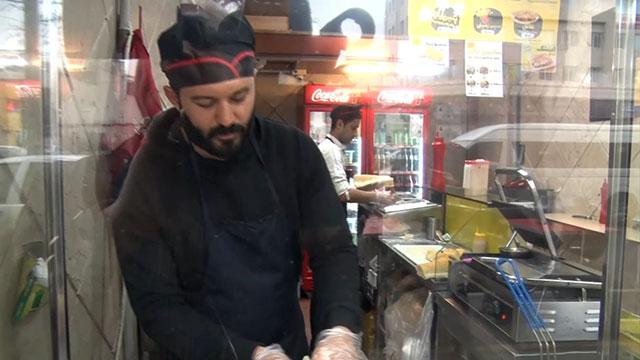
Impact of US sanctions
US economic sanctions are affecting the lives of ordinary Iranians.
Unemployment among those in the younger generation remains high, at around 30 percent. It's difficult for young people, especially those with university degrees, to find jobs that allow them to use their skills. Many of them leave the country in search of better opportunities. Some studies suggest that Iran has the worst brain-drain problem in the world.
The mounting frustration is directed not just at the US for breaking its promise, but also toward the Iranian government.
In 2018, there was a major demonstration over the recession, and there have been several more anti-government protests and strikes since then.
As well as being dissatisfied with the economy, many young people are demanding changes to the Islamic regime's strict social rules.
A move to change the Iranian culture
Since the revolution, Western music and culture have been strictly off-limits. But there are signs of change.
A cafe opened in Tehran that centers on Western rock bands, targeting youth who enjoy Western culture. Many young people are calling for reforming strict systems and anti-American attitudes.

24-year-old Amir Mansouri is one of them. He aspires to be a professional musician, even though performances in front of an audience are restricted in Iran. He says, "Young people like me wish for more freedom than we have now."
Mansouri was encouraged by the words of a cleric called Seyed Hasan Aghamiri who is now hugely popular among young people. Aghamiri tells them, "God gives you talent. Nothing will stop you. You don't have any limits."
While traditional clerics preach about the need to follow strict religious rules, Aghamiri says religion cannot stop people's actions, and calls for younger generations to think on their own.
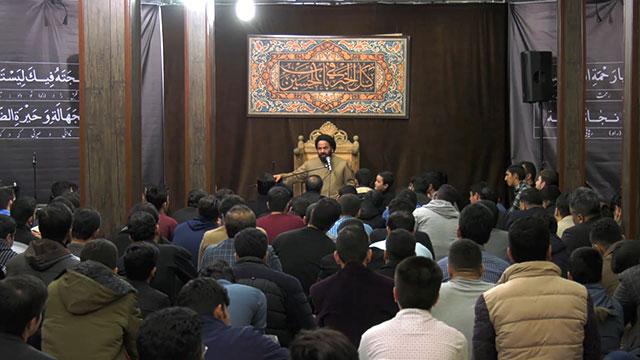
Mansouri says he was inspired to focus more on his music after he met Aghamiri. "Aghamiri's words are filled with energy. They make young people like me very happy," he says.
As a spokesperson for youth, Aghamiri has over 1.8 million followers on social media.
Interview with Aghamiri
NHK had a chance to interview this influential man. When we asked about hostility toward the United States, he showed us a video clip he had uploaded.
Aghamiri says, "I'm against pressure and antagonism by the US, but I wish for the happiness of Americans."
He separates himself from the anti-American sentiment around him, and says he respects the country. His actions do not come without consequences. Iran's religious court started procedures to strip his status as a cleric on allegations of disturbing public opinion.
But Aghamiri is determined to keep supporting those aspiring for change. He says, "Young people are using the Internet. They have no prejudice and they accept what I say. I won't let anything limit their freedom."
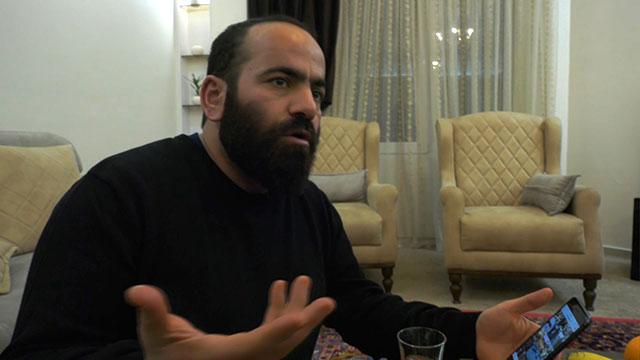
Young people and the Iranian regime
The Iranian government has shown some flexibility toward demands for change. President Rouhani is considered a moderate, and since he took office in 2013, restrictions on public morality have become noticeably more lenient.
But changes that challenge the government’s fundamental values are still strictly prohibited. For example, the law on how women dress remains unchallenged. There is a sense that Islamic law has become merely a formality, since it’s less relevant in people’s lives these days.
Activist predicts change in Iran
We interviewed an activist who fought in the revolution and has been pushing for political reform. Reformist activist Ebrahim Asgharzadeh talked about recent signs of change in the country. He says, "The people of Iran respect the revolution and do not deny it. However, it is not like they're saying society has not changed. In the end, it has changed and therefore new approaches must be considered."
He goes on. "I think the next 10 years will be intense. There will be drastic changes. But, they will not be revolutionary in nature -- no new regime will be ruling, and revolutionaries will not shift to the sidelines. What I believe is that the leaders' attitudes will change. This change will happen due to the influence of social change. Social changes are like a mountain underwater...Like an iceberg where you can only see its tip. The tip is already visible in the streets of Tehran -- it's namely the younger generation."
He says the current regime has no choice but to change. But the question is on how much change can really be expected from this government.
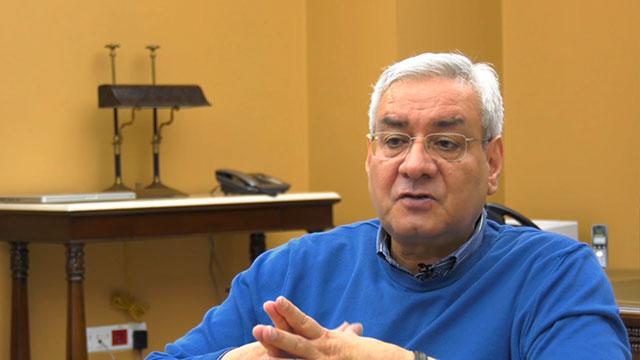
The Islamic Revolutionary Guard Corps and other hardline conservative groups are strongly opposed to any change. In particular, anyone who has benefitted from the current system will try to protect their vested interests at all costs.
But some religious leaders we interviewed expressed their support for the separation of government and religion, or for the abolishment of the law requiring women to wear a hijab. We sensed that even among those who support the government, there’s a willingness to debate and to reexamine the status quo.
The government is likely to face more discord as it considers how much to give into the demands of the younger generations. Forty years after the revolution, it seems the country has reached a major turning point.


